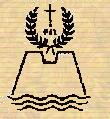|
THE ART OF
DYING WELL
LESSONS
FROM THE GOSPEL
We
have seen that to die well we must live well. And living well consists in
living lives with faith, hope and charity. Christ repeats this theme better
in three Gospel lessons.
To
die well, Christ said: "Let your loins be girded about and your lamps
burning in your hands, and you yourselves, like men waiting for their
master's return from the wedding; so that when he comes and knocks, they may
straightway open to Him. Blessed are those servants whom the master, on his
return, shall find watching." (Lk. 12:35-37)
"The
Lord's coming" can refer either to the second coming or to our own
death. But when Christ describes it as "a thief coming in the
night," then He refers to our own death because the second coming is
not "a thief in the night." It is a grandiose arrival with many
great signs before it.
There
are three commands in the above Gospel text: firstly, we must have our loins
girded. Secondly, that we have lamps burning in our hands. And finally, that
we keep watch and await His coming.
What
does it mean to gird one's loins? St. Peter speaks about ". .
.girding the loins of your understanding," and St. Paul about ". .
.girding your loins with truth." It means learning and understanding
the teachings of Christ always. Death must find you learning all the
commands of Christ.
Putting
it another way, death must not find us occupied with the concerns of this
life, even the most necessary. Martha was chided by Christ because of her
concern in doing good to Him. How much more if your concerns are to amass
superfluous riches, useless honors and the fulfilling of harmful desires.
Secondly,
"and let your lamps be burning." It is obedience to the things you
have learned that gives light to your eyes. There are many who know the
commands of Christ but commit so many disobediences; they have lamps but do
not carry them in their hands. Many learned men commit very grave sins
because they do not consult the law of Christ.
If
King David, when he saw Bathsheba, consulted the law of God, he would never
have fallen. But because he consulted the beauty of a woman, he, a wise,
just and holy king, committed adultery.
Indeed,
you must have your lamps lighted, but not hidden in your room. It must be in
your hands, i.e. you have to obey those commands. He who always has the lamp
of the Lord's commands before the eyes of his mind runs with confidence to
meet his Lord.
The
third and final duty of the faithful servant is to always be on watch. . .as
he is uncertain when the Lord will come. "Blessed are those servants
whom the master. . .shall find watching."
To
be watchful means to diligently examine your conscience, to uncover what you
did, said, desired and thought of at night or day, to find any stain of sin
in them and to see that there is no delay in seeking the remedy of true
repentance. You should ask God for the gift of contrition, ponder the
gravity of your sin and heartily detest them. Remember that through sin, you
offend not men but God.
With
this exercise, it will almost be impossible to sin while dying or to die
while sinning or to be caught off-guard by death. Death, therefore, with its
uncertainty, can never harm us.
St.
Robert Bellarmine, Book 1, Chapter 4
(06-09-03)
|
